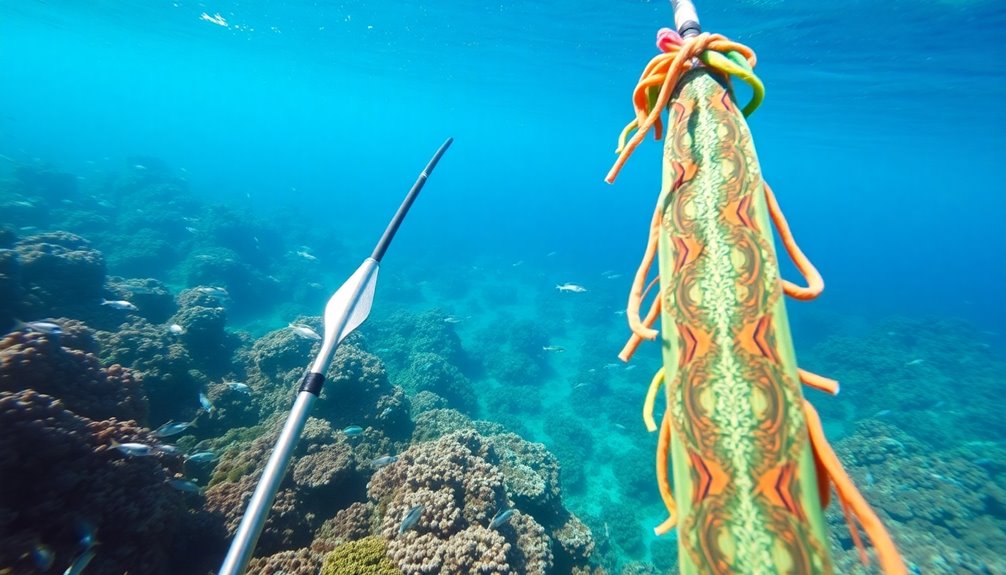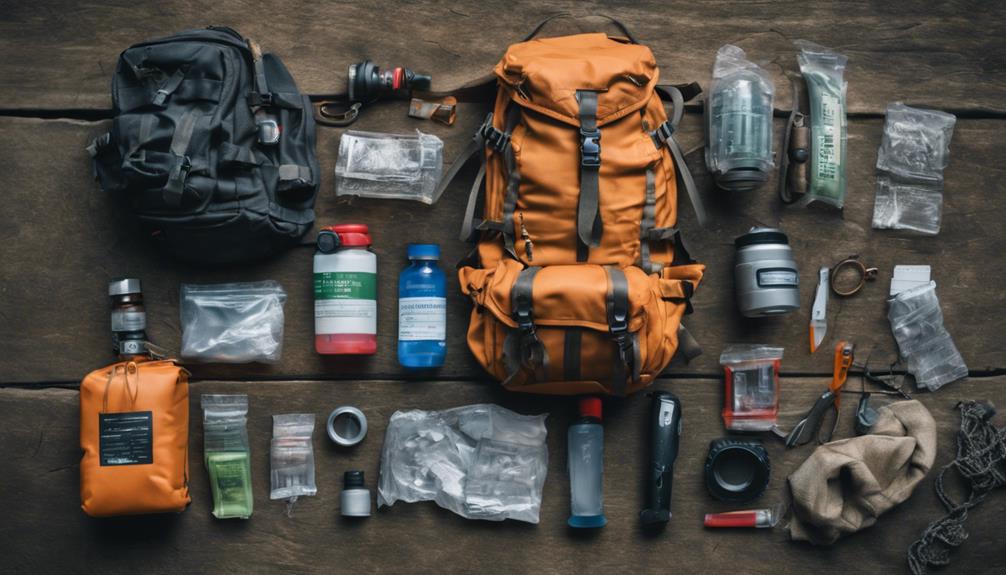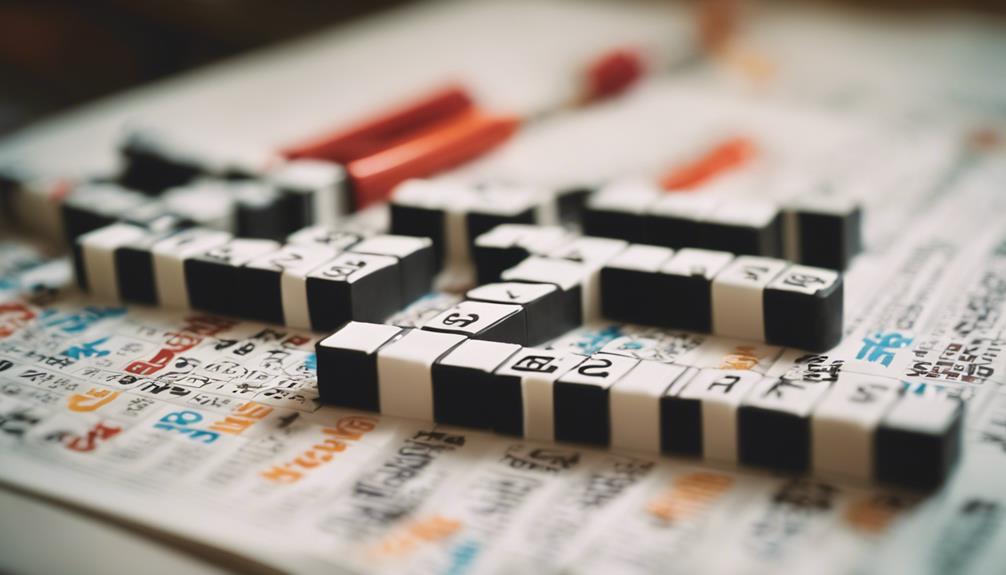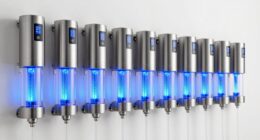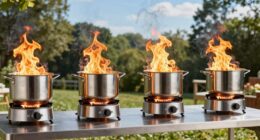Extreme heat can be tough to handle, but you can stay cool and safe with some easy tips! First, drink plenty of water—aim for at least 32 ounces every day. It helps to stay indoors during the hottest hours and wear light clothing. Enjoy cool baths or showers to beat the heat and consider visiting air-conditioned places like libraries or malls. Remember to eat hydrating snacks like watermelon too! Keep an eye out for signs of heat exhaustion, like dizziness. There's so much more to discover about how to stay safe and healthy in the heat!
Key Takeaways
- Stay hydrated by drinking at least 32 ounces of water daily and consuming hydrating foods like watermelon and cucumbers.
- Seek refuge in air-conditioned spaces like libraries or malls during peak heat hours to avoid heat exposure.
- Wear lightweight, light-colored clothing and take cool baths or showers to help regulate body temperature.
- Prepare an emergency kit with water, non-perishable food, and medications to ensure you have supplies during extreme heat.
- Monitor for signs of heat-related illnesses, such as dizziness or heavy sweating, and take action immediately if symptoms arise.
Preparing for Extreme Heat

When preparing for extreme heat, it's crucial to take proactive steps ahead of time. First, find local cooling locations like libraries or malls where you can seek refuge when the heat gets too intense. You'll want to contact your health department for more resources, too!
Keep your home cool by using drapes, shades, and window reflectors to block sunlight. Installing attic ventilators and properly insulating your air conditioning can help keep things nice and cool inside. Additionally, consider utilizing energy-efficient heat pumps for better climate control during extreme weather. Regular maintenance of heat pumps can significantly enhance their efficiency, ensuring optimal cooling during heat waves, as proper maintenance is crucial for airflow and overall system performance. Having a bug out bag ready can also ensure you have the necessary supplies in case of an emergency.
Don't forget about emergency preparedness! Make sure you have plenty of cool water, non-perishable food, and any necessary medications ready just in case power outages happen. Additionally, consider investing in portable camping toilets to ensure comfort during any extended heat-related emergencies where outdoor facilities may be limited.
It's also a good idea to regularly check the weather forecasts and heat warnings to stay informed and protect yourself.
Staying Safe During Heatwaves

Staying safe during heatwaves requires vigilance and smart choices. First, make sure to drink water often, even if you don't feel thirsty. Staying hydrated is super important to avoid heat-related illnesses. Additionally, consider the importance of hydration when planning your daily activities to ensure you maintain optimal fluid levels. Research shows that dehydration can impair cognitive function, making it harder to make safe decisions in extreme heat. To further support your hydration efforts, incorporating essential oils for hydration like peppermint oil in your drinks can provide an invigorating boost. It's crucial to understand that personal and community resilience plays a key role in managing the effects of extreme heat. Regular consumption of herbal teas can also help maintain hydration and provide additional cooling effects.
Lightweight, light-colored clothing can help keep you cool, so choose your outfits wisely! If you need to do outdoor work, try to schedule it for the early morning or evening when it's cooler. Avoid the peak sun hours between noon and 4 PM, as they can be really hot.
If you don't have air conditioning, don't worry! You can visit local cooling centers like libraries or shopping malls. These places are great spots to escape the heat and stay safe.
If you feel overheated, taking a cool bath or shower can help lower your body temperature quickly. Also, keep an eye on young children, as they can be more sensitive to heat.
Recognizing Heat-Related Illnesses

Recognizing heat-related illnesses is essential for your safety during extreme temperatures. If you don't pay attention to your body, you might find yourself in a tough spot! Here are some important signs to watch for:
- Heat cramps in your muscles
- Weakness and dizziness
- Confusion or extreme sweating
Heat exhaustion can sneak up on you, showing signs like heavy sweating, weakness, and nausea. If you notice these symptoms, it's vital to move to a cooler place and start staying hydrated. Additionally, prolonged exposure to heat can lead to serious health issues, including respiratory issues that may require immediate attention. Staying hydrated helps to prevent heat cramps, which can occur due to excessive sweating and loss of electrolytes. It's important to remember that just like a heat pump needs maintenance to operate effectively, your body also requires care during extreme heat. Engaging in activities that promote auditory processing can also help maintain focus and cognitive function during these challenging conditions.
Remember, a body temperature of 105°F (40.6°C) or higher could mean heat stroke, which is very serious! This condition can cause dry skin and confusion. If you see these signs, it's time to get medical attention right away!
Also, don't forget about sunburn! It can be painful and might need cool showers to soothe your skin. Maintaining a focus on self-care routines can help you recover and stay safe during extreme conditions.
Recognizing symptoms early can help you stay safe and enjoy your time in the sun. So, keep an eye out, stay cool, and have fun!
Hydration and Nutrition Strategies

When the heat turns up, keeping your body hydrated is super important!
You should aim to drink at least 32 ounces of water every day, even if you don't feel thirsty, to help prevent dehydration. Additionally, consuming juices like beet juice can also improve blood flow, which is beneficial during hot weather. Quinoa, with its complete protein profile, can also be a great addition to meals to support energy levels in the heat. Incorporating low carb high protein breakfast options can help you maintain energy throughout the day. It's also wise to consider incorporating low-fat ice cream in moderation for a refreshing treat that can provide hydration and a boost of energy.
Plus, munching on yummy foods like watermelon and cucumbers can keep you refreshed and feeling great! Additionally, incorporating foods high in water content can further enhance your hydration efforts.
Increase Water Intake
Extreme heat can quickly deplete your body's hydration levels, making it essential to greatly increase your water intake. During hot weather, aim for about 32 ounces of water daily, even if you don't feel thirsty yet. Additionally, staying hydrated can help your body effectively eliminate airborne particles that might irritate your respiratory system. Proper hydration also supports air purifier maintenance, ensuring that your environment remains conducive to clean air. Staying well-hydrated can also enhance your body's ability to engage in activities like hula hooping for weight loss, which can be a fun way to stay active during the heat.
Remember, staying hydrated is key to avoiding dehydration! Regular hydration supports motor skills that are crucial for maintaining energy during physical activities.
Here are some fun ways to keep your hydration up:
- Drink water regularly: Make it a habit to sip water throughout the day.
- Snack on hydrating foods: Foods like watermelon and cucumber are packed with water and taste great!
- Monitor hydration closely: Keep an eye on how much you drink. Thirst isn't always the best sign of hydration needs.
If you're working outside, don't forget to drink one cup of water every 15-20 minutes. This keeps your hydration levels just right!
And steer clear of drinks like alcohol and caffeine, as they can lead to dehydration and make the extreme heat feel worse. Additionally, consider incorporating protein-rich foods into your meals, as they can help maintain energy levels and support overall hydration.
Avoid Dehydrating Beverages
Staying hydrated goes beyond just drinking water; it also involves being mindful of what you consume. In extreme heat, it's super important to avoid dehydrating beverages that can make you feel even thirstier.
First off, steer clear of alcoholic beverages. They can really zap your hydration and mess with your body's temperature control. You don't want to feel hot and bothered when you're trying to enjoy the sunshine! Additionally, maintaining a high vibrational energy during extreme heat can help you feel more refreshed and energized. Regular outings with your dog, such as to pet-friendly cafes, can also promote hydration awareness while enjoying the environment. Herbs like turmeric known for their anti-inflammatory properties can also aid in overall wellness during hot weather, and incorporating adaptogenic herbs into your diet may help your body better cope with heat stress.
Caffeine is another sneaky culprit. It acts like a little thief, taking away the fluids your body needs. So, it's best to limit how much coffee or soda you drink on those hot days.
Instead, focus on hydrating foods, like juicy watermelon and crunchy cucumbers, which are packed with water and help keep you cool.
If you're out and about for a while, consider grabbing some electrolyte-replacement beverages. These can help replace those lost salts and fluids, making sure you stay energized and happy! Regular monitoring of indoor air quality can also contribute to your overall hydration strategy, as poor air quality can affect how well your body retains fluids.
Hydrating Food Choices
Maintaining hydration during hot weather is easier when you make smart food choices. Eating hydrating foods can be a fun and tasty way to keep your body feeling great! Here are some delicious options to take into account:
- Watermelon: This juicy fruit is over 90% water, making it perfect for hydration. The act of choosing hydrating foods can significantly enhance your overall wellness.
- Cucumbers: Crunchy and invigorating, cucumbers are another great choice to help you stay cool. Many eco-friendly options for summer snacks focus on fresh, hydrating produce. Incorporating high-fiber foods like lentils can also support digestion during the heat.
- Soups: Light, broth-based soups can add hydration to your meals without heating up your kitchen. Additionally, regular maintenance of your hydration habits can ensure you remain comfortable in extreme heat.
Don't forget about other fruits, like oranges and strawberries! They're not only invigorating but also packed with essential vitamins and electrolytes. Eating lighter meals, such as salads filled with leafy greens and fresh veggies, helps you stay cool while contributing to your hydration.
You can also enjoy homemade frozen fruit pops for a sweet treat that hydrates. These yummy snacks are a fantastic way to keep your spirits high and your thirst quenched. Additionally, staying hydrated is crucial for maintaining a healthy credit score, as it supports overall well-being and productivity.
Home and Outdoor Cooling Tips

When temperatures soar, finding ways to keep your home and outdoor spaces cool becomes essential for your comfort and safety.
First, if you have air conditioning, use it! It helps keep your space nice and chilly. If you don't, don't worry! You can block sunlight with drapes or shades, which can lower indoor heat by up to 20 degrees Fahrenheit. Consider adding a water park visit to your summer plans for a fun way to cool off, as many hotels offer water park access that can enhance your experience. Additionally, visiting a regional water park can provide you with access to variety of attractions designed for cooling off. Also, keep in mind that shade trees can significantly reduce indoor temperatures when planted strategically around your home.
When you're outside, schedule activities during the cooler parts of the day, like early morning or late evening. This way, you can still enjoy the outdoors without getting too hot.
Remember to take frequent breaks in the shade and always have drinking water handy to stay hydrated.
If you’re cooking, try to limit the use of heat-generating appliances like ovens. No-cook meals are tasty and keep your home cooler! Avoiding the use of the oven will not only save on energy costs, but it will also help to keep your kitchen and home at a more comfortable temperature during the hot summer months. No-cook meals can be just as satisfying and delicious as those that require using fire for cooking. Plus, they often take less time to prepare, allowing you to spend more time enjoying the warm weather rather than being stuck in a hot kitchen.
You can also make a DIY cooling system by placing a bowl of ice in front of a fan.
And if it gets too hot, find a cooling center like a library or shopping mall to relax and cool off. This is especially important during peak hours for fitness centers as they may also offer a respite from the heat.
Don't forget to help cool the animal friends in your life too!
Resources for Community Support

When the heat turns up, it's super important to know where to find help and cool places!
Community cooling centers, like libraries and community centers, are great spots to escape the heat and chill out with friends. Additionally, many local stores, such as Kroger Liquor Store, have extended evening hours for those looking to shop after the sun goes down. Installing a home security system can also help you feel more secure while you seek respite from the heat, as security system costs can vary based on your specific needs. Understanding the importance of long-term financial planning can also be crucial for preparing for extreme weather conditions.
Plus, having emergency contact resources handy can make sure you and your neighbors stay safe and supported during those scorching days! Additionally, knowing the store hours of local grocery stores can help you plan trips to stock up on essential supplies while avoiding the heat.
Community Cooling Centers
During scorching heat waves, community cooling centers serve as essential lifelines for those seeking refuge from the sweltering temperatures.
These air-conditioned spaces, like libraries and malls, provide a cool escape when the sun's rays are blazing down. They're especially important for vulnerable populations, such as the elderly and young children, who are at higher risk for heat-related illnesses.
Here's what you can find at these fantastic centers:
- Refreshing hydration stations to keep you cool and hydrated.
- Health screenings to make sure you're feeling your best.
- Friendly staff ready to help you find the services you need.
Local health departments often share information about nearby cooling centers, so don't hesitate to check their websites or give them a call.
Make sure to find out about any eligibility requirements, too! These centers are here to help everyone stay safe during extreme heat events.
Emergency Contact Resources
In extreme heat situations, having the right emergency contact resources can make all the difference. If you or someone you know needs help, don't hesitate to call emergency services at triple zero (000).
For non-life-threatening heat-related concerns, the Victorian Virtual Emergency Department is a great option. You can also reach out to NURSE-ON-CALL at 1300 60 60 24 for 24/7 health advice.
It's super important to check on community members, especially older adults. Make sure they're staying cool in an air-conditioned building and drinking water every chance they get. You can encourage them to stay hydrated and take breaks from the heat.
Don't forget about the Health Translations Directory! This resource helps everyone understand safety measures during extreme heat, as it offers information in multiple languages.
The health department is also available to answer any questions you may have. By staying connected and informed, we can support each other during these hot days.
Frequently Asked Questions
How Do You Survive Unbearable Heat?
When you face unbearable heat, it's important to stay cool and safe!
First, drink plenty of water, even if you're not thirsty. Wearing light, breezy clothes helps too!
If it gets too hot, find a shady spot or head to a cool place like a library.
Close the curtains at home to keep the sun out, and watch for signs of heat exhaustion.
How to Survive in Extreme Heat?
When you're facing extreme heat, your main goal is to stay cool and safe!
Drink plenty of water all day, even if you're not thirsty. Wear light, loose clothes to help your body breathe.
It's also smart to take breaks indoors during the hottest hours. If you feel dizzy or weak, find a cooler spot right away.
And remember, local cooling centers are great places to chill out when it gets too hot!
How Do You Tolerate Extreme Heat?
Tolerating extreme heat can be a challenge, but you can do it!
Start by drinking plenty of water, even if you're not thirsty. Wear light clothes that help you stay cool.
Plan your outdoor fun for early mornings or late evenings when it's cooler, and give yourself breaks if you feel too hot.
You can also take cool showers or use damp towels to refresh yourself.
Stay safe and enjoy the sunshine!
What Temperature Is Too Hot for Survival?
When it comes to heat, you can't judge a book by its cover!
Temperatures reaching 95°F (35°C) can be tough on your body, especially if it's humid. If it feels like 100°F (37.8°C) or more, you're in the danger zone.
Prolonged exposure to temperatures above 104°F (40°C) can be life-threatening.
Remember, if you start feeling dizzy or weak, it's time to cool down and seek shade or air conditioning.
Stay safe!
Conclusion
So, as you brave those sizzling days, remember to keep cool and stay safe! Who needs a sauna when you've got summer heat, right? Hydrate like a champion, and give your home a revitalizing makeover with fans and shade. If things get too toasty, don't forget to reach out to your community for help. Let's turn up the fun and turn down the heat together, because surviving extreme heat is way better with a smile!


